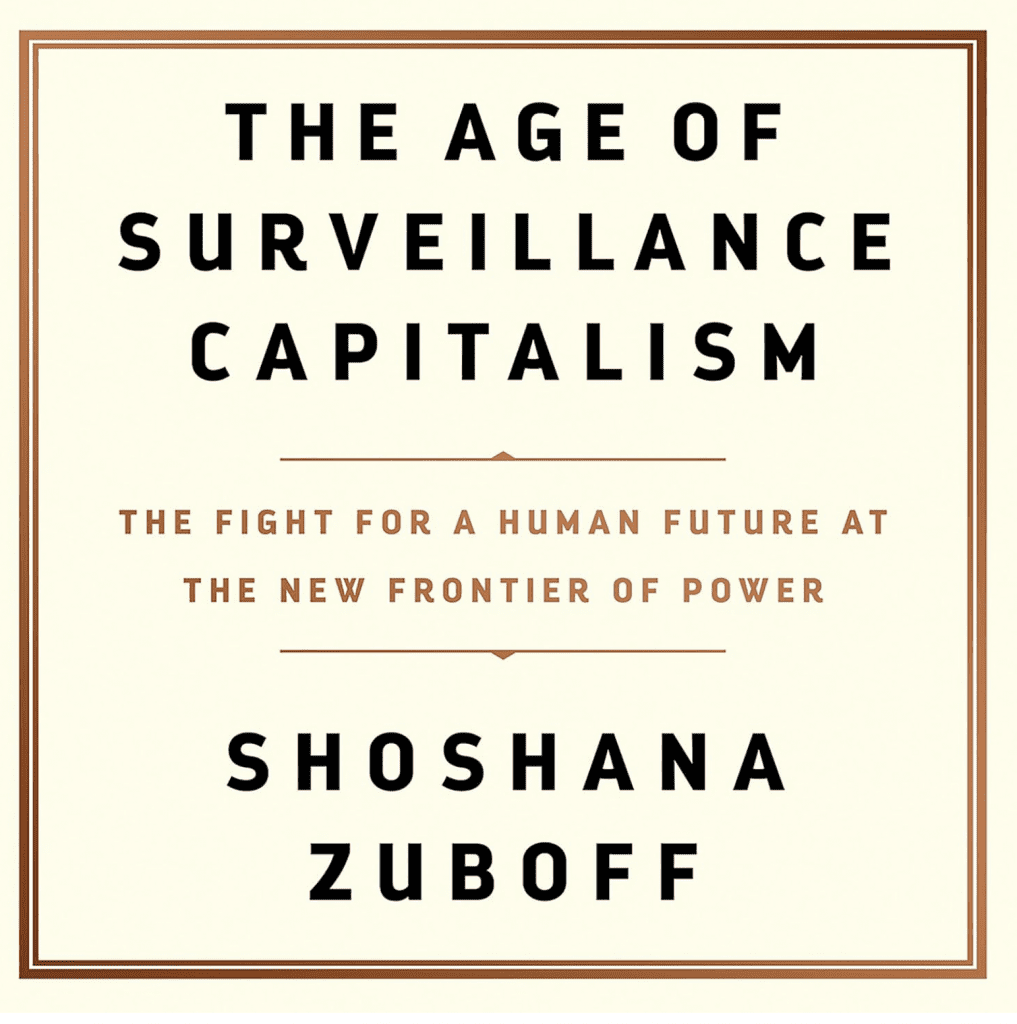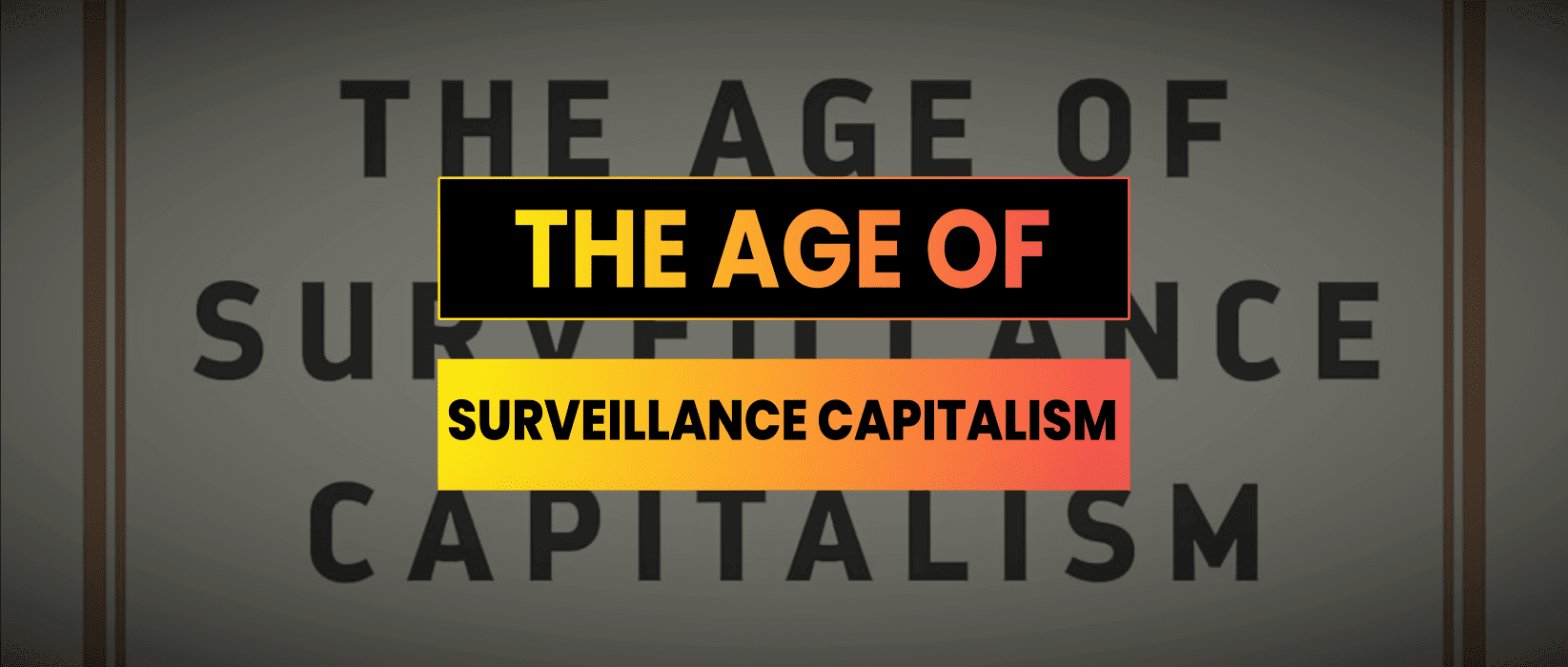Shoshana Zuboff’s The Age of Surveillance Capitalism is a landmark work of political economy and social critique that introduces a powerful framework to understand how major tech firms have forged a new, unregulated form of capitalism.
Zuboff argues that we are living through a historical turning point, where a handful of technology corporations most notably Google and Facebook have developed and normalized a novel economic logic: surveillance capitalism.
This system extracts and monetizes personal data as raw material for behavioral prediction and modification, without meaningful consent, oversight, or accountability.
The book’s core thesis is that surveillance capitalism is not an inevitable byproduct of digital technology, but rather a specific economic model deliberately invented and deployed by corporations. It represents a profound transformation in the relationship between capitalism, the individual, and society. Zuboff likens it to a “coup from above,” wherein private capital has claimed and commodified human experience in much the same way industrial capitalism appropriated nature.

Shoshana Zuboff is a professor at Harvard Business School and a former faculty associate at the Berkman Klein Centre for Internet & Society at Harvard Law School. Her academic expertise spans business, technology, and society, giving her a unique interdisciplinary lens to analyse power dynamics in the digital age.
This book is essential reading for policymakers, technologists, ethicists, scholars, and general readers concerned with digital rights, democratic integrity, and the future of free will. It equips readers with the conceptual tools to identify, question, and resist the hidden mechanisms of power embedded in everyday technologies. Ultimately, Zuboff’s work serves as both diagnosis and call to action demanding structural change before surveillance capitalism becomes irreversible.
Surveillance Capitalism: Definition and Mechanics
Surveillance capitalism is defined as a new economic order that claims human experience as free raw material for hidden commercial practices of extraction, prediction, and sales. Unlike traditional capitalism, which relied on labour and production, this system harvests data exhaust digital traces left by users and repurposes it into “behavioral surplus.”
Initially, behavioral data was used to improve products or user experiences (e.g, Google Search). However, Zuboff documents how Google, beginning in the early 2000s, discovered that surplus data could be used to predict future behavior creating a new revenue stream through targeted advertising. This led to the development of what she calls the “behavioral futures market,” where predictions about user behavior are bought and sold.
Key processes include:
- Data Extraction Collection of personal information beyond what is required for a service
- Data Commodification Transformation of this information into behavioral surplus
- Machine Learning & AI Analysis of surplus to generate predictive insights
- Behavioral Modification Nudging user behavior through algorithmic feedback loops (e.g, personalized ads, news feeds)
Zuboff emphasizes that this logic is not limited to advertising. It extends into insurance, health, finance, and even public governance. Surveillance capitalism monetizes certainty, reducing the unpredictability of human behavior for commercial gain.
Instrumentarian Power vs. Totalitarian Power
One of Zuboff’s most critical conceptual contributions is her distinction between instrumentarian and totalitarian power. While totalitarianism aims to control behavior through violence and ideological domination, instrumentarianism seeks control through pervasive monitoring, behavioral nudging, and algorithmic governance.
Instrumentarian power is characterized by:
- Asymmetry of knowledge (they know everything about us; we know nothing about them)
- Asymmetry of control (they can act on our behavior; we cannot opt out meaningfully)
- Epistemic inequality (they define what is known, how it is known, and what remains unknown)
This power is exercised not through coercion, but through predictive analytics, opaque terms of service, and dependency on platforms. The core danger is not oppression, but the erosion of self determination, autonomy, and the democratic process.
Behavioral Surplus and Predictive Products
Behavioral surplus refers to the data that exceeds what is needed for a user facing service. For example, Google Search collects not just the query, but also the timing, device type, location, and click pattern. These fragments are then processed using machine learning to identify correlations and patterns, which form the basis of predictive products.
These products are sold in behavioral futures markets, where advertisers, insurers, and other clients bid on the ability to anticipate and shape user behavior. What makes surveillance capitalism so lucrative is its predictive precision enabled by the constant refinement of surplus and the expansion of data extraction across domains (i.e. smart home devices, wearables, voice assistants, urban surveillance systems).
The Big Other
Zuboff introduces the concept of Big Other, an abstract, distributed system of surveillance and control. Unlike Orwell’s “Big Brother,” which was a centralized figure of state power, Big Other is decentralized, corporate, and operates invisibly. It functions through:
- Ubiquitous sensors (IoT, smartphones, CCTV)
- Persistent behavioral monitoring
- Algorithmic decision making systems
Big Other produces a condition of radical indifference-where individuals are no longer treated as unique persons, but as statistical data points optimized for prediction. It represents a new social architecture in which human behavior becomes input for systems that operate beyond human comprehension or consent.
The Economics of Certainty and Economies of Action
Traditional capitalism was about managing risk and embracing market uncertainty. Surveillance capitalism reverses this logic. Its aim is certainty-to eliminate randomness in human behavior so that companies can guarantee outcomes to their clients. Zuboff calls this the “economics of certainty,” which is made possible by:
- Comprehensive surveillance
- Real time behavioral tracking
- Automated interventions (e.g, recommendation engines)
Economies of action arise when these predictive capabilities are used not just to observe but to act on human behavior shaping decisions, preferences, and routines without user awareness. This marks the shift from prediction to behavioral modification, laying the groundwork for what Zuboff calls a “market driven coup on human will.”
Dispossession and Habituation
Zuboff details how surveillance capitalism achieved its dominance through a process of dispossession-users were never asked for meaningful consent, nor given alternatives. As with early colonialism, where land and resources were taken without regard for indigenous claims, surveillance capitalism expropriated human experience and repackaged it as data.
The process is reinforced by habituation-the normalization of intrusive practices. Over time, users become resigned to surveillance as the cost of convenience. Legal systems, ill equipped to regulate this new domain, have lagged behind, allowing tech giants to shape social expectations and norms through “surveillance exceptionalism.”
Takeaways
- Surveillance capitalism is not a technological inevitability but an economic invention, built deliberately by corporations to commodify human behavior for profit. Alternative digital futures are possible but require systemic change.
- Human experience has become the new raw material of capitalism. Through processes of extraction, commodification, and prediction, digital traces are transformed into behavioral surplus and sold in behavioral futures markets.
- Instrumentarian power replaces totalitarianism with data driven control. It relies not on force, but on asymmetries of knowledge, predictive analytics, and the erosion of human agency through algorithmic governance.
- Big Other constitutes a new kind of invisible authority, operating through ubiquitous sensing, opaque algorithms, and constant behavioral monitoring reshaping human society in ways that are difficult to detect or resist.
- Consent under surveillance capitalism is a fiction. Users are subjected to pervasive monitoring without meaningful choice, transparency, or recourse. Standard terms of service function as tools of dispossession, not protection.
- The behavioral surplus model has expanded far beyond advertising. From education and insurance to urban planning and law enforcement, predictive analytics are reshaping how institutions interact with individuals.
- Surveillance capitalism is fundamentally antidemocratic. It undermines self determination, fosters epistemic inequality, and bypasses the political process by establishing new rules without public debate or accountability.
- Resistance requires collective action and legal reinvention. Zuboff calls for a new “Charter of Digital Rights” and robust democratic oversight to reclaim the digital sphere as a space for autonomy, not extraction.
- Ethical innovation and fiduciary digital services are possible. Zuboff suggests that new business models can emerge that respect privacy, prioritise transparency, and treat personal data as an inalienable right, not a commodity.
- The fight against surveillance capitalism is the civil rights struggle of the digital age. Preserving human autonomy, dignity, and democracy will depend on our willingness to recognise and challenge the hidden architectures of power embedded in modern technologies.
The Age of Surveillance Capitalism does more than define a new economic logic; it reorients our understanding of power, freedom, and agency in the digital era. Zuboff’s synthesis of historical analogy, empirical research, and moral urgency equips readers not just with comprehension, but with clarity of purpose. It is both a cautionary tale and a blueprint for reclaiming the human future from forces that seek to reduce it to data.



